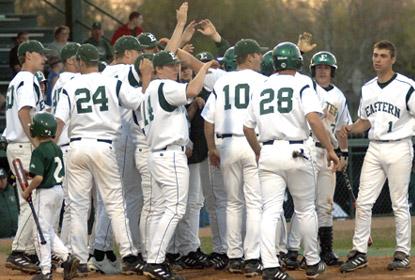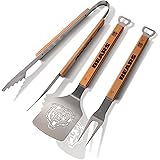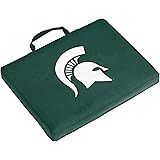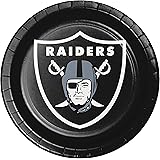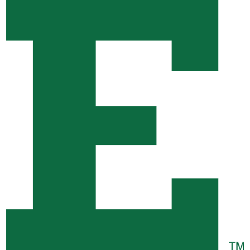
College Sports Established
1849
Location
Ypsilanti, Michigan
College Name
Eastern Michigan University
Collegiate History
1971 - Present / NCAA Division I
Conference History
1971 - Present / MAC Conference
Nickname
Eagles - Sports fans nationwide know that Eastern Michigan Eagles are a powerhouse in college athletics. But what many may not know is the fascinating history behind their nickname. The Eastern Michigan Eagles have been proudly representing their school since they adopted the name in 1991, but its origins date back much further than that.
The story of how these birds came to represent EMU begins with an alumnus named Fred Trosko, who graduated from EMU in 1929 and became a successful businessman and philanthropist. After making his fortune, he decided to give back by donating funds towards building a new stadium for his beloved alma mater – one which would be known as Rynearson Stadium (named after former EMU president William C Rynearson). In honor of this generous gift, it was decided that all teams playing at this venue should take on the mascot “Eagles” - thus beginning our journey into understanding why we now cheer for such majestic creatures when watching our favorite sports team compete!
While there were other mascots considered during initial discussions about adopting an official name for athletic teams playing at Rynearson Stadium (such as Greyhounds), ultimately, it was determined that no other animal could quite capture both strength and spirit like eagles do – making them perfect representatives of our university's values! This decision has certainly paid off over time; today, people around campus recognize these beautiful birds whenever they see them flying high above us or perched atop buildings throughout campus - reminding us how proud we are to call ourselves members of this fantastic community at Eastern Michigan University!
NCAA Championships
Baseball 0
Men's Basketball 0
Women's Basketball 0
Football 0
Soccer 0
- 1891
- 1982
- 1986
- 2008
-
Eastern Michigan plays its first football game
On October 21, 1891, Eastern Michigan (then known as Michigan State Normal College) played its first football game against Michigan State Normal School (now Western Michigan University) in Kalamazoo, Michigan. The game was played with 11 players on each side, and Eastern Michigan was led by its first coach, Walter S. Simmons. The final score of the game was not ... -
Dave Bing – Hall of Fame
Dave Bing was inducted into the Eastern Michigan Eagles Hall of Fame in 1982 for his outstanding achievements as a basketball player. During his college career at Eastern Michigan, Bing was a two-time All-Mid-American Conference selection and the team’s leading scorer in each of his three seasons. He averaged 24.8 points per game during his career at Eastern Michigan, which ... -
Eastern Michigan reaches the NCAA Tournament for the first time
The 1985-86 Eastern Michigan Eagles men’s basketball team finished the regular season with a record of 25-5, earning them a spot in the NCAA Tournament for the first time in school history. The team, coached by Jim Dutcher, was led by senior forward Earl Boykins, who averaged 15.9 points per game and was named the Mid-American Conference (MAC) Player of ... -
The Eagles win their second MAC championship
The 2008 Eastern Michigan Eagles baseball team finished the regular season with a record of 32-25, earning them a spot in the Mid-American Conference (MAC) Tournament. In the tournament, the Eagles won four straight games, including a 12-10 victory over Miami (Ohio) in the championship game, to win their second MAC championship in school history. The team was led by ...
To qualify as the greatest player for this team, the player must have played one season for this team. If not, we will remove the player.
* verifies that player has played for this team as an added player by a fan.
History of the Eagles
The Eastern Michigan Eagles have a long and storied history in NCAA sports. The team was established in 1891, making them one of the oldest collegiate teams still playing today. The Eagles have earned multiple conference titles and bowl game appearances as an NCAA institution.
In football, the Eagles are no strangers to success; they’ve won two MAC championships since joining the league in 1971: one in 1987 and another more recently in 2016 when they went 9-4 overall with an impressive 7-1 record within their division. They also made it to Motor City Bowl that year, where they lost narrowly by four points against Old Dominion University (ODU). Since then, EMU has been a consistent contender for the MAC West Division title and bowl games every season - something that any true fan should be proud of!
On top of this impressive track record on gridiron fields across America, EMU is also known for its successful basketball program, which includes five Mid-American Conference (MAC) tournament titles over a span from 1996 until 2012, when they last won it under head coach Charles Ramsey who led his team all way through National Invitational Tournament (NIT) quarterfinal round before bowing out at the hands of eventual champion Stanford Cardinal squad coached by Johnny Dawkins at a time! This speaks volumes about the quality coaching staff employed throughout the years while highlighting the importance given to the basketball programs within the university itself – something many schools lack nowadays, sadly enough...
Aside from these two major sports programs offered up by Eastern Michigan University, there are plenty of other varsity athletic teams, including baseball, softball, soccer, golf, tennis, cross country/track & field, volleyball, rowing, rugby plus a few others depending on what the school offers, each year, so if you're looking get involved athletics wise or want to learn little bit more about the rich history surrounding Eagle Nation then make sure check out official website online find out even information related upcoming events etcetera too!




